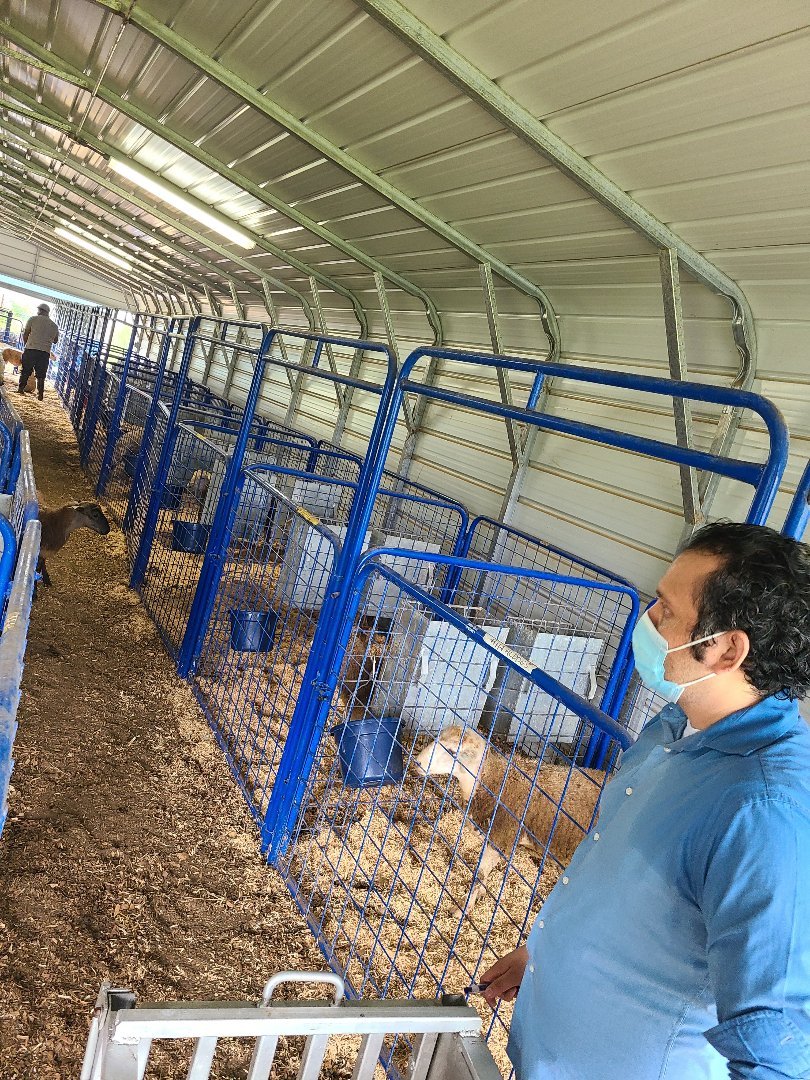An ongoing study at Fort Valley State University revealed that peanut skins could lead to better health and sustainability.
Dr. Andres Pech-Cervantes, research assistant professor of animal science at the 1890 Land-Grant University, discovered that peanut skins, which are a low-value byproduct, increase the concentration of antioxidants in lean meat.
“The idea of using peanut skins is to take advantage of potential opportunities we have here in the southeast,” he emphasized.
The key benefit is that the United States is one of the biggest peanut producers in the world, with Georgia currently holding the No. 2 spot as a top peanut producer in the country.
Under Evans-Allen and Sustainable Agriculture Research and Education (SARE) grants, Pech-Cervantes is studying the effect of dietary supplementation of peanut skins with and without polyphenols on the performance, rumen fermentation and carcass characteristics of Florida native sheep. His research relies on next-generation techniques like metabolomics and metagenomics to understand the mode of action of feed additives in ruminants (cows, sheep and goats).
“We are rethinking an idea that was applied in the 1980s in which ruminants can consume nonedible products, such as peanut skins,” Pech-Cervantes said.
Peanut skins, commonly produced during the peanut manufacturing process, are discarded. By ruminants consuming this byproduct, it could have health benefits for humans who consume the meat because peanut skins can be a rich source of antioxidants and are precursors of alpha-tocopherol (vitamin E).
“Antioxidants are a good source to prevent diseases or potential cancer problems,” Pech-Cervantes said.
Therefore, he and his team, including graduate students Voris Bryant II and Modoluwamu Idowu and undergraduate students Britany Howard and Nayelly Mendez, incorporated the antioxidants from the peanut skins into the meat of Florida native sheep. This breed of ruminants is parasite resistant because they are well adapted to this area, which is an additional benefit.
“Parasites are a problem in the southeast of the U.S., which limit animal production,” Pech-Cervantes noted.
The team studied 33 intact male lambs, feeding only 11 of them a low proportion of peanut skins (20 percent) for 42 days, plus seven days of adaptation. They were randomly blocked by body weight (11 lambs per treatment) and distributed among three isonitrogenous and isocaloric diets: control diet, diet plus 20 percent of intact peanut skins and diet plus 20 percent of treated peanut skins without polyphenols. Then, the lambs were slaughtered to evaluate carcass characteristics and rumen fermentation. Dry matter intake, body weight and blood samples were collected and analyzed using the effects of treatment, interactions and random effects of the animal.
Dietary intact peanut skins and polyphenols did not affect the dry matter intake and final body weight compared to the control. Dietary treated peanut skins without polyphenols reduced blood glucose levels compared to intact peanut skins and the control, but intact peanut skins had lower blood urea nitrogen than treated peanut skins without polyphenols and the control.
Both intact peanut skins and treated peanut skins without polyphenols decreased the total volatile fatty acid concentration and increased the rumen pH compared to the control. The carcass weight was similar among treatments but treated peanut skins without polyphenols reduced the dressing percentage compared to intact peanut skins and the control. Both intact peanut skins and treated peanut skins without polyphenols reduced liver weight compared to the control.
Conversely, intact peanut skins and treated peanut skins without polyphenols increased the vitamin E (alpha-tocopherol) concentration in lean meat compared to the control. This study showed that intact peanut skins increased the incorporation of antioxidants in meat without impacting animal performance.
“What we observed is that vitamin E concentrations increased by more than 100 percent when we fed animals with peanut skins compared to those animals not fed peanut skins. The results suggest that feeding peanut skins to small ruminants increases the quality of the meat and the incorporation of antioxidants,” Pech-Cervantes said.
The FVSU researcher explained the objective is to produce sustainable food by taking a byproduct that is commonly produced by peanut industries in Georgia and use a local breed of ruminants that is well adapted to this area.
“This is something that could be explored and exploited in the future as an alternative to produce better meat with higher concentrations of vitamin E. Meat produced at FVSU is consumed by the community, and we are ensuring that we are producing quality products,” Pech-Cervantes said.
He added sustainable agriculture could help keep product prices low by meeting the demand and maintaining competitive prices. His research addresses this matter because the cost of meat produced per pound is cheaper when using byproducts.
“This research is significant because consuming better meat ensures a better life. We are thinking of future generations and taking advantage of byproducts instead of throwing them away,” Pech-Cervantes said.

